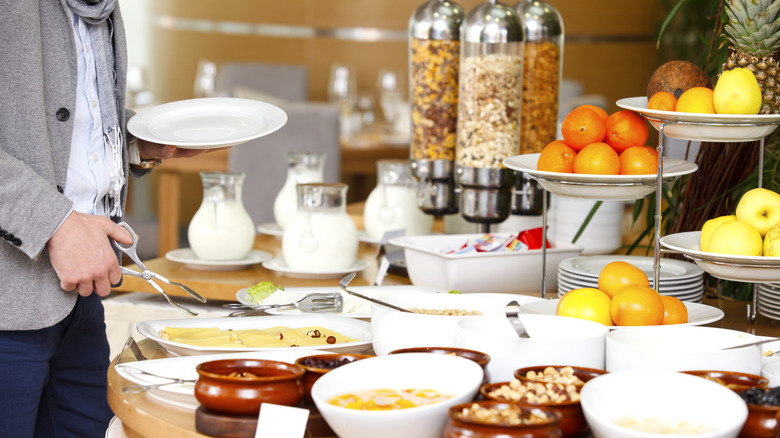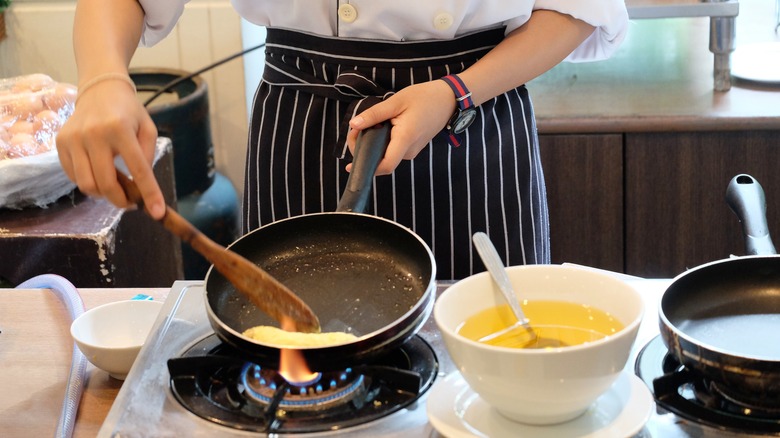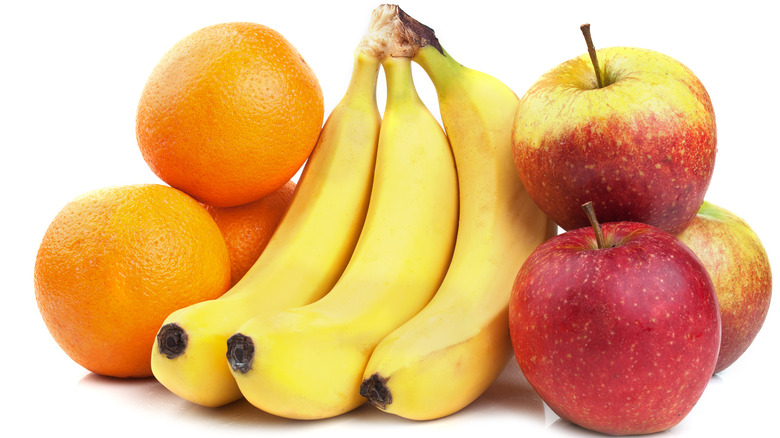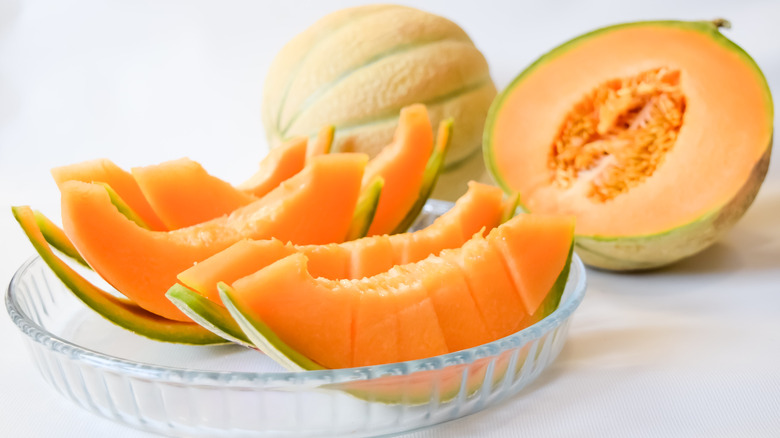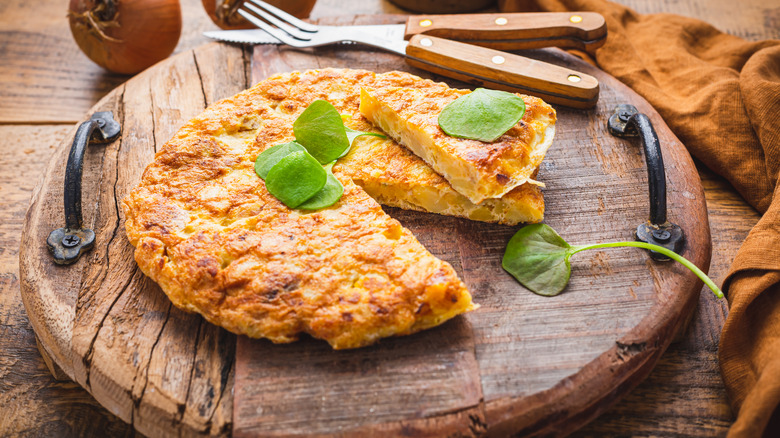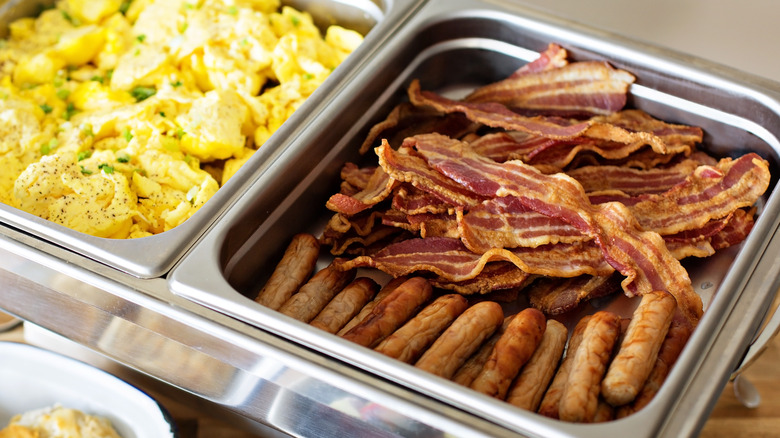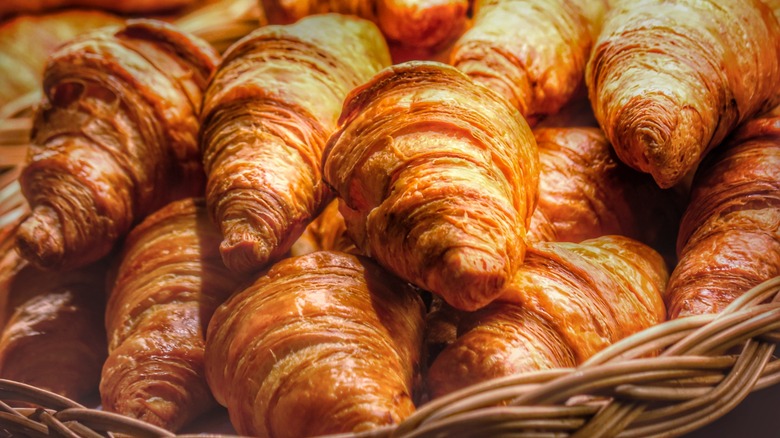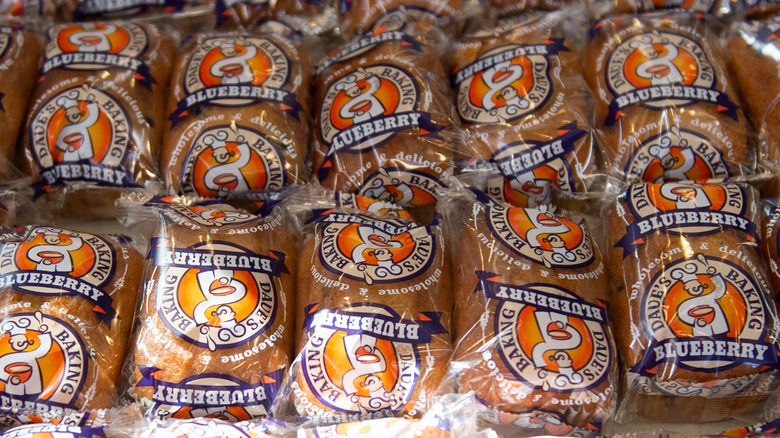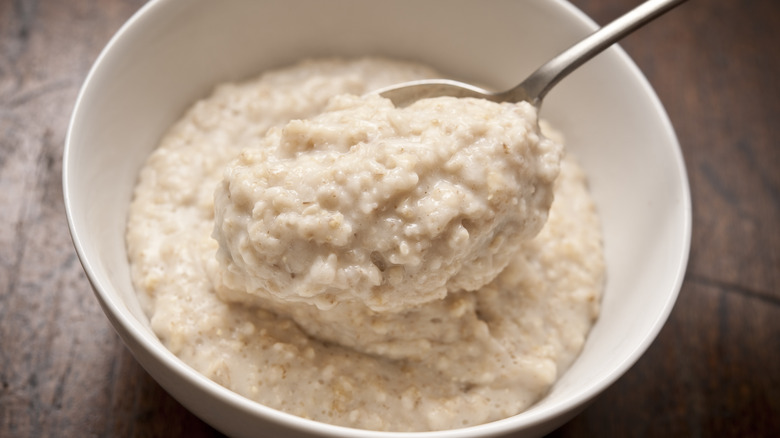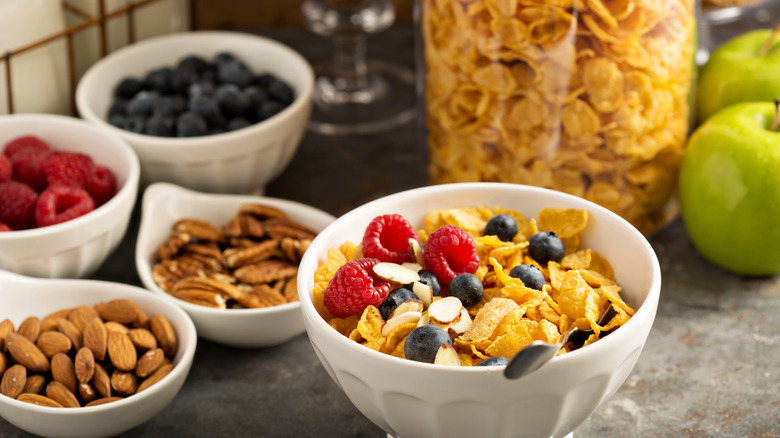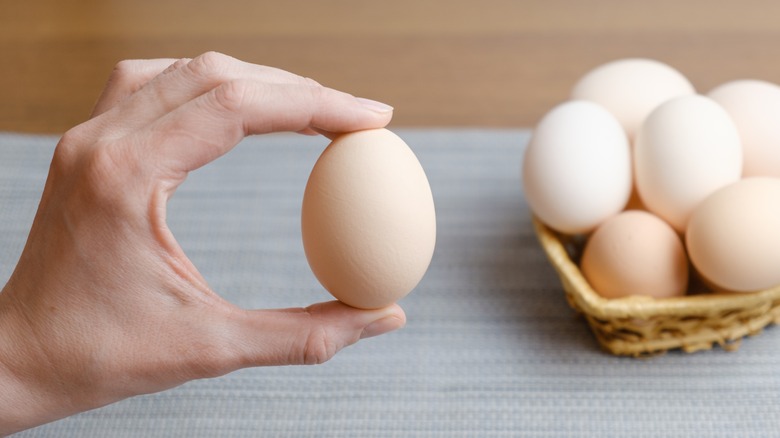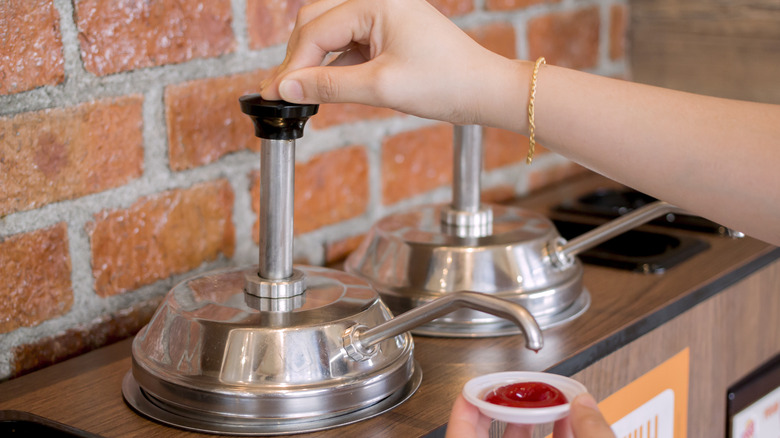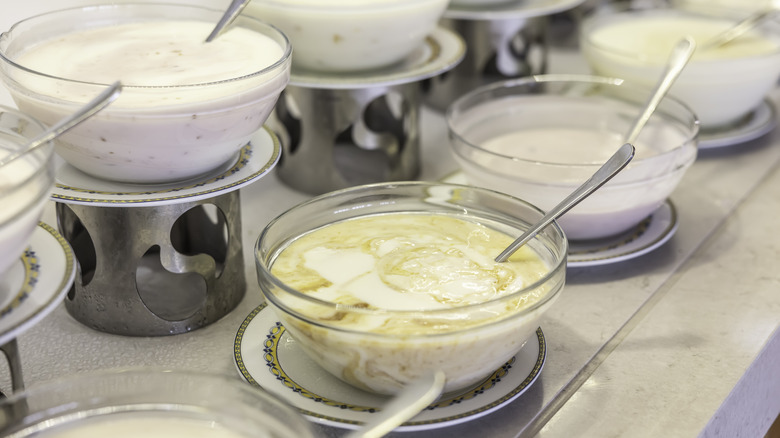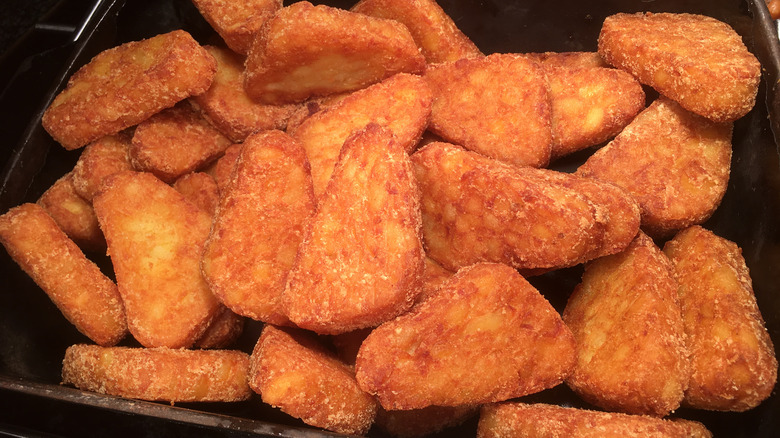The 7 Best Foods To Eat At A Hotel Breakfast Buffet And 7 You Might Want To Skip
When you're on vacation, the breakfast buffet is where your senses come alive for the day. These all-you-can-eat affairs are a necessary pit stop before you head out to see the world. While browsing the buffet you'll find everything from eggs to pancakes to local favorites. While some of the many foods you'll find are perfect to start your day, there are others that might be best left under the heat lamp.
During the COVID-19 pandemic, breakfast buffets were a risk because they are high-traffic areas where multiple people share space, time, and serving spoons. Hoteliers across the world have adapted their practices to mitigate these risks, and in the process have made the buffets even classier. Measures like individually plated and wrapped food items and servers being on hand to serve your food have become more common. All of this makes for a way more relaxing, up-market experience.
But while breakfast buffets may have changed their style, they may not have changed their food. Breakfast buffets usually have a wide variety of foods to choose from, and these can range pretty widely in their nutritional quality and freshness. And when it's the first thing in the morning, it can be difficult to accurately figure out which food items are the best-made and healthiest, and which will leave you feeling dissatisfied or sluggish. And that's why we decided, once and for all, to spill the beans about which breakfast buffet items to leave off your plate, and which to stock up on.
Eat: Omelets from the omelet station
If it's freshness that you're after, the omelet station should be your first stop. Omelet stations offer you a level of control over what you're eating that other items at the buffet won't be able to match, meaning you can make healthy choices that will leave you satisfied. As these omelets are cooked in front of you, you can ask the chef to use less oil or cheese. Additionally, the omelets are made with fresh eggs, unlike some other egg options at a buffet, which can use powdered versions. And you can also make sure the eggs are cooked exactly to your liking.
For the most nutritious, filling result, we'd recommend loading up your omelet with as many vegetables and proteins as possible. Vegetables like spinach or broccoli work excellently in an omelet and can provide important nutrients like vitamins C and K, as well as fiber that will keep your appetite at bay. Protein will also help with this, and will also add to the flavor of your omelet. Chopped ham or chicken will boost an omelet's protein significantly; but if you don't eat meat, ask your chef if they'll add in a few extra egg whites, giving you more protein without the additional fat of the yolks.
Skip: Scrambled eggs
Scrambled eggs are hardly the most appetizing item at a breakfast buffet. More often than not, they are a lumpy, slightly sloppy affair, piled into a tureen where they're left to slowly coagulate under a heat lamp. This mixture is broken down even further by the endless streams of people coming over to stir it mindlessly and then move on, meaning that instead of getting well-formed curds, you're essentially left with a stodgy egg soup.
Hotel breakfast buffet scrambled eggs are also frequently made using slightly questionable ingredients and methods, which helps them avoid the labor of having to crack and beat endless amounts of eggs (and therefore save time and money). Instead of cooking them in a pan, some hotels simply mix plastic-wrapped powdered eggs with water and microwave them, before breaking the grey lumps of eggs that form down with a potato masher. Although powdered eggs are made from dehydrated fresh eggs, meaning they carry a lot of the same nutrition, it's hardly a gourmet recipe — and there's no accounting for any additives that are placed into powered egg mixtures to add flavor or improve texture.
Eat: Bananas and oranges
If you're struggling with what to eat at the buffet, it's hard to go wrong with skin-on fresh fruit. Options like oranges, grapefruits, and bananas are all nutritious options that will allow you to start your day in a light way. Fresh fruit is full of vitamins and fiber, as well as water, which bulks them out, making them more satisfying and hydrating. The fiber, too, helps to keep hunger at bay. Bananas, in particular, are a great choice if you hit the hotel bar a little hard the night before, thanks to their high potassium content, which can help to re-establish the minerals in your body that can be lost by drinking alcohol.
Skin-on fresh fruit can be especially useful from a food safety perspective. When fruit hasn't been peeled none of its interior is exposed, limiting its exposure to bacteria. However, it's useful to bear in mind that there's no account for who else has touched it. Germs can pass from a person's hands onto pieces of food, and these germs can then cause infection when we come into contact with them. If you're at all concerned about the food safety in the establishment you're in, it might be worth skipping them.
Skip: Sliced cantaloupe
We can understand why cantaloupe might be an appealing choice at a buffet. As fresh fruit, it can be a light, invigorating way to kick off your day of sightseeing, and it's full of important nutrients like beta-carotene, folate, and potassium. However, it can also be uniquely problematic from a food safety perspective. Cantaloupe is especially prone to harboring bacteria because of its rind, which has a netted structure. This essentially gives microbes lots of places to hide and makes it harder to clean them effectively, increasing the chance that the bacteria make their way to your plate.
Cantaloupes and other melons are also way more prone to growing bacteria on their flesh, due to the fruit's composition. Melons have an unfortunate combination of a high water content, an abundance of natural sugars, and an almost neutral pH level. This all makes it highly attractive to bacteria -– and they love it even more when the fruit is left at room temperature for a significant length of time, creating the ideal situations for germs to thrive. As such, we'd recommend giving cantaloupe a wide berth at the buffet, unless it's just been sliced or has been clearly kept at refrigerated temperatures.
Eat: Regional food
Traveling to a new country opens up a world of new experiences. As well as hearing new languages and seeing new places, it's also the best time to try new foods. There's no better place to start than at the hotel breakfast buffet. Hotel buffets usually offer a selection of regional breakfast foods that allow you to dine like a local, and they take the hassle of selecting from a menu out of the equation.
While it can be tempting to stick to what you know for breakfast, it's worth remembering just how exciting and diverse breakfast foods can be in different parts of the world, and what it looks like in different countries. In Vietnam, for example, pho is a common breakfast staple, and trying it at the start of the day instead of the end can provide you with the same warming, comforting experience first thing in the morning. In Venezuela, meanwhile, stuffed arepas are common, with the bread often filled with breakfast items like scrambled eggs. Breakfast food in different countries is also a great way to try out regional twists on familiar foods, like Spanish tortilla de patatas, a dense, filling omelet made with sliced potatoes.
Skip: Sausages and bacon
Sausages, bacon, and other breakfast meats form a core part of pretty much every breakfast buffet out there. But while they may be familiar and reliably tasty, they're also far from the healthiest thing you can eat. Sausage and bacon are both processed meats and can contain high levels of sodium and saturated fat, with the latter potentially having a detrimental effect on cholesterol levels, per the NHS.
Additionally, processed meats can also have nitrates or nitrites in them, which act to extend their lifespan, but which can also have an impact on your health, and most notably your bowel health. When you consume nitrates or nitrites, you also consume N-nitroso compounds, which are potentially volatile chemical contaminants. These compounds can increase the risk of developing bowel cancer, according to the Cancer Council – and that can happen when eating as little as 50 grams of processed meat daily.
Eat: Croissants
At a breakfast buffet, it's hard to go wrong with croissants. Although these items are frequently bought by the hotel, they're usually of pretty high quality, meaning that they're generally a reliable choice at breakfast. Croissants are made by building layers of butter-rich dough on top of each other, before being shaped into their classic half-moon shape. This building process, which takes time and expertise, is what allows them to puff up when cooked, with the interior remaining soft and the outside crispy and flaky.
Even store-bought croissants go through this intricate process, and they can deliver a quick, yet decadent breakfast. Croissants are also a great option if you're planning to grab your breakfast from the buffet and eat it on foot as you head out to your first sight of the day, thanks to their portability. The buttery dough also means that they're pretty much always delicious, so they're a fantastic choice if you're finding the breakfast buffet a little bit overwhelming. Just grab your croissant, a coffee, and some orange juice, and you've got an easy, light, yet satisfying morning meal.
Skip: Packaged pastries and muffins
While fresh pastries are usually a good choice at a breakfast buffet, packaged pastries and muffins might be slightly less appealing. Packaged pastries tend to become overly soft and flabby, with the condensation that gets trapped inside the plastic ruining their flaky texture. These pastries can also have preservatives and additional ingredients in them as, unlike fresh pastries, they're made with shelf-life in mind — and it can be difficult to check exactly what's inside each one when they're sitting in the buffet line-up.
Muffins, too, can be supremely high in sugar, and may also contain corn syrup. While this gives them a next-level sweetness, it's also a potential consideration for our health. Corn syrup is abundant in processed foods, but it has also been associated with numerous health concerns, like weight gain, higher cholesterol levels, and harm to the liver. High fructose corn syrup (or HFCS), a common form of the sweetener, may also be problematic for your pancreas, with a study conducted by UCLA's Jonsson Comprehensive Cancer Center indicating that the high fructose levels in HFCS could potentially contribute to cancer growth. As with packaged pastries, it's also difficult to tell which ingredients are in muffins, and which other preservatives or additives may have been included.
Eat: Oatmeal
Oatmeal is one of the safest bets at a breakfast buffet. While it might seem unadventurous, it's a solid choice for folks who don't want to eat too much, but still want to feel full and energized. Oatmeal gets its filling power from a combination of high fiber and protein, with a half-cup of cooked oats containing 4 and 6 grams, respectively — and that's before milk is added, which will boost the protein content further. The type of fiber in oats, beta-glucan, is also one of the healthiest around and can help you to both keep your cholesterol controlled and your gut nourished, according to Mayo Clinic Health System.
Oatmeal is also almost infinitely adaptable, and the breakfast buffet, with all its options, is the perfect place to experiment. Sprinkle a little granola over your oatmeal for some double-oat action and extra crunch, or mix in fresh fruit. For some extra sweetness, grab a few of those portable jam packets and stir them into the oats, or add a spoonful of honey. Adding a handful of nuts into oatmeal can also give it extra fiber, fat, and protein, and mixing in some peanut butter can do the same, while also adding a salty kick. Best of all, if you're not satisfied by the first bowl, you can head back up to spoon out more, without having to worry about cooking it yourself.
Skip: Cereals
The most basic of breakfast buffets usually have a selection of breakfast cereals, and if you're not in the mood to choose, they can present a safe option — especially if you're traveling with kids. But even those that are innocent-looking can be surprisingly unhealthy. Cereals are highly processed foods, and a huge amount of sugar can be added to them. Kids' cereals can be especially sugary and contain more than cereals marketed to adults, with some bowls containing the equivalent of 2½ teaspoons of sugar.
Cereals can also be full of additional ingredients that both preserve them and improve their appearance, with dyes like Red Dye 40 being associated with ADHD and irritability in children, via Healthline. This is all made more complicated by the fact that at many breakfast buffets, cereals are decanted into bowls or containers instead of being kept in their original boxes. This means that you have no way of checking exactly which ingredients have been included, or how much sugar is in a serving.
Eat: Hard-boiled eggs
Hard-boiled eggs are one of the most popular breakfast foods around, and that doesn't change when you're at a breakfast buffet. These items are standard at most buffets, and they're filling and nutritious. Eggs are composed primarily of protein and fat, and with six grams of protein in an average egg, just a few of them can fill you up fast. Hard-boiled eggs are also the best source of choline, a nutrient that's important for cell and brain health.
With hard-boiled eggs, too, you can be sure that you're eating something that has had nothing added to it. This means that you won't have to worry about any additional salt or seasonings that can raise the eggs' sodium levels (and also change their taste). While some breakfast buffets also have soft-boiled eggs, they can be slightly difficult to judge. Both hard-boiled and soft-boiled eggs are often kept in heated baskets or tureens, and this can cause the eggs to continue cooking as they sit, meaning the yolks of soft-boiled eggs can often be hard by the time you get to them. Go for hard-boiled eggs instead, to avoid disappointment. And if you're really sneaky, you can pocket one or two, and enjoy them as a snack throughout the day.
Skip: Condiments from a pump
Many breakfast buffets, as well as lunch and dinner ones, provide an array of condiments to spice up your food. But these can be surprisingly dangerous, and not just if you accidentally pick an extra-hot sauce. Shared condiment dispensers are a hotbed for germs due to the high level of use by multiple patrons. These dispensers often don't get as much cleaning attention as other communal areas at a buffet and aren't swapped out like serving spoons. Therefore, in a single service, you might have dozens of people making contact with them and potentially spreading microbes.
Remember, too, that this can also occur with other communal items. Drink menus and salt and pepper shakers on your table might be cleaned infrequently. If your breakfast buffet has a drinks dispenser or a soda fountain, this is also likely to be a high-traffic area that sees numerous people touching it throughout the morning. Soda machines should be cleaned rigorously on a daily basis to maintain the best hygiene practices and keep them healthy — and if the dispenser in your buffet looks a little dirty, it might be best to give it a wide berth.
Eat: Yogurt
Yogurt is hardly the star attraction at a lot of breakfast buffets, but in our view, it's an underrated choice. Yogurt is a superb option if you want a lighter food that still satisfies your hunger, and it's usually very nutritious. If you can find it, Greek yogurt is one of the best to go for. It's particularly protein-rich and can help to control your appetite, and is often abundant in good bacteria, which your gut health will thank you for (per Healthline). In its plain form, it's also a fantastic base for any other complementary flavors you find at the buffet, like fruit, muesli, or maple syrup.
Yogurt, particularly when individually packaged, is also a good option from a hygienic point of view. With individually-packed yogurts, you don't need to worry about shared serving spoons and the potential germs that can live on them. They can also take the stress out of taking more than you end up eating, which can leave you with the dilemma of whether you make yourself overly full, or contribute to food waste. Just make sure that you're checking the nutrition label if you're going for an individual yogurt. Even small, innocent-seeming, low-fat yogurt pots can have very high amounts of added sugar.
Skip: Hash browns
When hash browns are freshly cooked, they're a delight: Crispy on the outside, soft and plump on the inside, and shot through with the sharpness of salt. But how long have they been sitting out at that breakfast buffet? Unfortunately, breakfast buffet hash browns tend to lose their crispness and become soggy and disappointing fast. This happens because as the potatoes cool, the starch inside them starts to release moisture. This moisture then works from the inside of the hash brown to its outer edges, dampening it.
This is made even worse by the fact that in breakfast buffets, hash browns are often piled on top of each other, meaning that any steam from the lower items has nowhere to escape, and ends up essentially steaming the potatoes. While you might get lucky with a fresh batch straight out of the kitchen, the last thing you want is valuable plate space taken up with soggy, oily potatoes. We'd recommend you get your carb fix over at the bread station instead. Most breakfast buffets have an excellent selection of fresh local bread that you can cut yourself and toast, providing you with a reliably crispy, warm slice.
